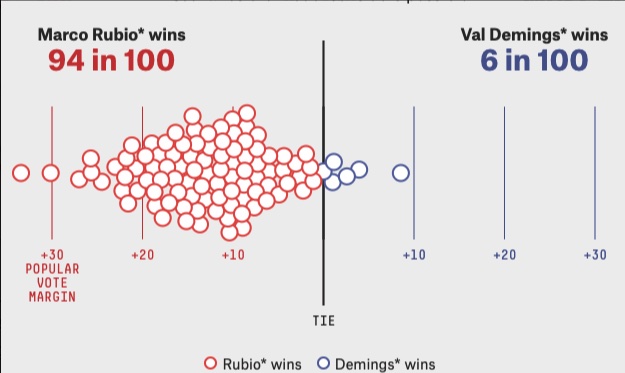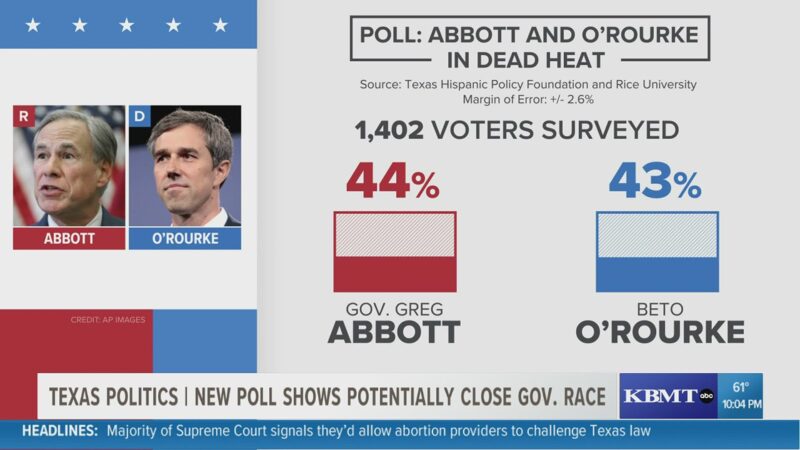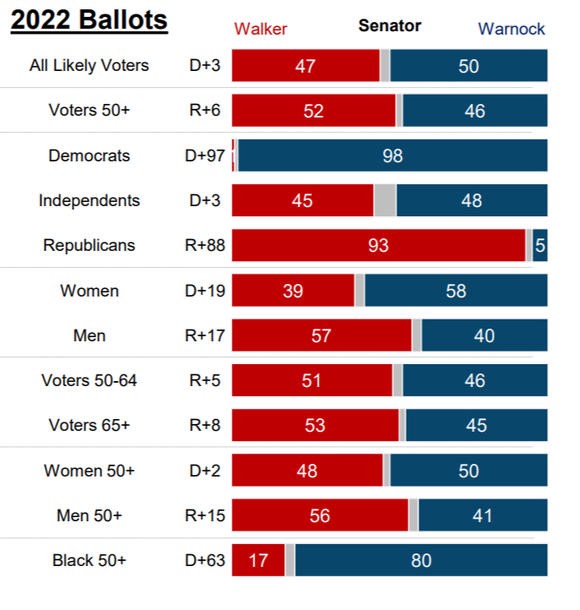Key midterm races, including those in Georgia, Texas, Florida, and Pennsylvania, could determine who controls Congress for the next two years. We turned to our own Chris “Fox” Wallace, noted poker pro and aspiring political analyst for a strategic assessment of how each candidate can improve their odds and pull off victories while trying to bridge a growing chasm between Americans.
“Game theory mistakes are rampant in politics, even when we consider the real motivation of politicians,” Wallace says. “Understanding the system better helps us see those mistakes accurately and understand that some of those mistakes are results of an entirely different set of motivations.”

As a CardsChat news reporter, strategy author, and game theory expert, Wallace recently weighed in on the similarities of game theory in poker and politics.
For example, if a poker player folds early to avoid revealing a mistake, they’re not maximizing their chance of winning but are working to prevent further damage to their table image. The concept of playing Game Theory Optimal (GTO) poker involves making only the decisions that make the most long-run profits, using ranges and probabilities to determine the best move.
America’s perpetual two-party climate has been the primary factor causing a growing divide in the country. As candidates go extreme left or right to secure their respective party’s nomination, undecided independent voters, often key to election victory, are left in a lurch.
Democratic politicians running in tightly contested Senate elections, such as John Fetterman in Pennsylvania, Val Demings in Florida and Raphael Warnock in Georgia, as well as those looking to secure gubernatorial elections like Beto O’Rourke in Texas, would do well to take advice from game theory experts to secure their respective elections.
In politics, we see similar issues where the actions are meant only to secure elections, rather than make actual progress toward improving their districts. This leads to politicians taking the “safer” approach and relying heavily on their own party’s voters to secure elections when they really should be appealing to different viewpoints and genuinely fixing issues.
Reading the table in Texas and Florida
O’Rourke is looking to unseat Republican Gov. Greg Abbott in Texas, a state that is often considered to be the pinnacle of right-wing politics. Florida is seeing a similar story with Demings, the former chief of police in Orlando, challenging Republican Marco Rubio for his seat in the US Senate. Both Rubio’s and Abbott’s positions have been held by Republicans for decades, which suggests that the GOP comes in with a huge advantage. With job security being all politicians’ real priority, Rubio and Abbott theoretically only needed to rally their base and secure primary wins to get reelected. However, their challengers present real threats, with polls only showing a six-point lead for Abbott and a nine-point lead for Rubio.

Further compounding this issue is the voter affiliation trends. In Florida, Republican voters have outweighed Democrats since 2021, with Democrats steadily decreasing over the past two years. Plus the amount of Florida voters with no party affiliation has been increasing for years. Figures are similar in Texas, with Republican primary voters outweighing Democrats by a two-to-one margin. Meanwhile, over 80% of the 17 million registered voters in Texas didn’t vote in the primary.
Given the Republicans’ voter-base advantages, one solution for Demings and O’Rourke is to appeal to the independents.
“Those who are less interested in politics likely weren’t part of the group that Rubio and Abbott needed to rile up to secure their primaries,” Wallace says. “So these voters tend to avoid party affiliation, Demings and O’Rourke will have to take the route of tying unpopular issues to the incumbents, such as the overturning of Roe vs. Wade, to craft a narrative of, ‘If this side keeps winning, what’s next?’”
In the eyes of game theorists, this could be the only way to secure support from the middle-of-the-aisle voters needed to beat the polls in otherwise red states.
Is Trump Warnock’s key to victory?
Election season in Georgia will feature Democratic incumbent Warnock looking to hold his US Senate seat over the Republican challenger, former NFL running back Herschel Walker. The specific seat has represented a more contested region in recent history. The back-and-forth has been evident in the past few years, with Joe Biden’s 2020 win forecasting a new environment for the Peach State, as Georgia previously hadn’t swung Democrat in a presidential election since Bill Clinton’s first run in the 1990s. While many Democrats may not be threatened by Walker’s primary victory, the former football star brings Donald Trump’s endorsement, which could prove his advantage or his downfall.

For Warnock the strategy relies on heavy Democratic voter turnout. For the left, the Trump endorsement is practically a warning sign. A win for Walker is a win for Trump, which obviously is bad news for the many whose 2024 votes were more against Trump than for Biden.
“Herschel Walker is the Republican candidate in this race because he was hand-picked by Donald Trump,” Wallace explains. “And while Trump may have won the presidency in 2016, the table is not the same today.”
Wallace says that Trump won the GOP primaries by starting with the biggest stack and wielding it like a pro. “Love him or hate him, what Trump did in 2016 was a clinic on exactly how to front-run a primary race. He started with something like 10% support but was still the most popular candidate in a huge field. He used that lead to pick off the second most popular candidate over and over until there were none left.”
Walker, however, will need to play a much better heads-up match than he has thus far if he wants to beat a more experienced, sharper candidate in Warnock.
Though Republicans outvoted Democrats in the Georgia primaries by more than 500,000 votes, polls currently indicate Warnock is favored among independents, suggesting he mostly needs a strong turnout from his own base to secure re-election. However, that may not be enough. Identifying independent constituents who don’t want to see a Trump-backed candidate taking a crucial senate seat would be an important part of securing the votes needed to be reelected.
“If Walker wants to beat Warnock, he’ll need to throw a hail mary into the end zone,” Wallace says of the need for a high-risk play. “Walker was a running back, and grinding it out on the campaign trail doesn’t seem to be working in his favor.”
High stakes in Pennsylvania
Pennsylvania features another key senate race that’s gotten significant media attention. Lieutenant Governor John Fetterman recently slowed down his campaign due to health issues, but the latest polls still give him a nine-point lead over Dr. Mehmet Oz. This race features another heavily Trump-endorsed candidate in Oz, who has embraced this support and taken up the key talking points to build support among the GOP base.
“The real question here is what Oz wants out of this race,” Wallace says. “Does he really want to win this one race, or would he prefer to get his name out there with the Republican establishment and win an office sometime in the next six or eight years? If he is really trying to win this election, then he needs to gamble more and take risks because he is not in great shape right now. He is short-stacked at the end of a tournament and is likely to be the next player out, so he might as well gamble.”

For Fetterman, it may come down to how well he can read his opponent.
“If Oz is looking at politics as a long-term career move, then he doesn’t want to do anything crazy. A good showing, and enough campaigning to get his name out there as a safe candidate, might be better,” Wallace explains. “Growing a mailing list, building some support, and making the right friends in the Republican party has a lot of value if he’s looking to run again in the future or become a commentator or get another job that is related to his political ambitions.”
The seat in question was most recently occupied by a Republican, while a Democrat sits in the other. Additionally, Biden only narrowly took the state from Trump in 2020, further adding to idea that the state is politically on the fence. Adding to complications for the Democrats in this race is Fetterman’s overly authentic persona, as well as his appeal to both progressives and blue-collar voters with various policies. His reluctance to support a fracking ban isn’t beloved by new-age Democrats, while his push for criminal justice reform can turn the tough-on-crime right-leaners off.
In the May primaries, Democratic voter turnout outweighed the Republicans by more than 500,000 voters. Given this, appealing to the undecided voters would give him an even more substantial lead, as Democratic turnout is likely to continue to be healthy given that Fetterman was the clear favorite heading into the primary. Furthermore, Oz’s endorsement from Trump is likely to encourage the Democratic base to turn out to the polls to avoid giving the available seat to another MAGA Republican. Focusing on Fetterman’s blue-collar desire to bring fracking jobs and bolstering the steel industry is likely the best way to achieve this goal.
Game theory sub-optimal
Game theory and real strategy have been historically lacking in political campaigns because the right play to win the race might be the wrong play for a long-term political career. A big gamble might give the underdog a better shot to win, but if it goes badly it could damage their long-term political ambitions. For a politician who wants to win now, appealing to the center makes a lot of sense. They should be doing everything they can to appeal to literally everyone and get those votes.
But someone who is looking to build a long-term political career has to be much more careful. An appeal to the center could involve statements and positions that could come back to hurt them in the future. This is particularly a problem for Republicans right now because they have several positions that are not favored by the general public. From gun control to abortion and even gay marriage, they hold views that their base feels strongly about, but are not supported by a majority of Americans.
“The political climate is unlikely to change anytime soon, for exactly the reasons I wrote about in my first article,” Wallace says, “so working the system this way is going to be the key to long-term success in American politics for at least another generation.”


